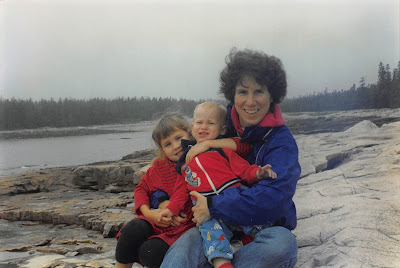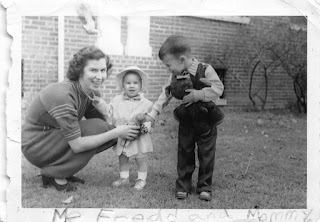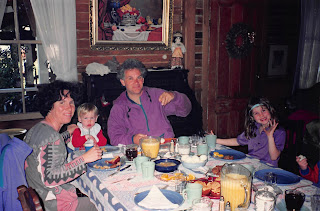 |
| Dana, Evan, Mom, coast of Maine, 1992 |
Becoming a mother is a life-changing experience.
Every woman who has given birth has a “birth” story. My friend Franny summarizes the birth experience with the phrase, “Isn’t childbirth fun?” Many of these stories tell of the extreme physical nature associated with delivering a healthy baby. Some describe medical emergencies from giving birth in the car on the way to the hospital to losing significant quantities of blood after birth. In my case, I would have died had it not been for life-saving surgery. The birth itself, however, is but a brief start to a lifetime of motherhood.
Those early weeks of a new baby’s life go quickly—a mixture of physical endurance and simple bliss. Babes adjust to new surroundings, drinking milk, crying, and sleeping. Moms adjust to changing hormones, leaky breasts, and punctuated sleep. By the first few months, babes and moms are usually in sync with a routine that covers 24 hours, some predictability, and more direct communication. A mother’s transformation has begun.
 |
| Baby Dana, 2 weeks old, 1988 |
Sadly in the United States, after a few months, moms usually have to return to work. Babes are cared for by others and the conflicts in a mother’s mind unfold. In my mother’s era (1950s) when I was a babe, moms usually did not work “outside of the home” meaning they worked full time 24/7/365 taking care of small children, a home, and a partner. In my day (1990s), moms stayed in the workforce and hired nannies or took their babes to family daycare, in a person’s home with only a few kids. If you hired a nanny, you set the rules; if your babe went to family daycare, there were few rules. Although expensive, daycare was more affordable then.
How has motherhood shaped my life?
Raising young children was the hardest work I’ve ever attempted—but the most rewarding. Motherhood shaped me for a life of taking care of others, taking primary responsibility for what I did and how I lived. Being a mom forced me to look outside of myself and think about the welfare of others, more than I had done before. I had to put my needs second on many occasions. Motherhood made me “younger”, dance freely for no reason, and laugh at silly jokes. I developed the sense of humor of a high school kid. I learned to not take myself too seriously. I learned how to shop for food efficiently, buy clothes for kids quickly, and be a great Santa Claus. I learned how to rustle up a nutritious dinner from whatever was in the fridge. I became expert at thinking on the fly. I tried to let kids learn from their mistakes—hard to do, but necessary. I learned to compromise with my husband about the care of the kids, and we made a good team.
 |
| My mom, me, Brother Fred, 1953 |
Today, two big changes have shifted how and when moms return to work. One hugely positive change is the ability for dads to take a significant amount of time off for paternity leave. [In the 1990s, my husband was given 2 weeks of paternity leave.] My friend Seth took off half a semester when each of his daughters was born. He developed a routine: bike rides in the mornings, grocery shopping trips, and nap times, when he answered emails, worked on manuscripts, and mentored students. His babies got to know him, although they still went to their mom when life was rough. Equal time for both sexes (or the other partner) serves to strengthen the roles of both parents for anticipating their child’s needs and care.
Most babes, now, enter a childcare center with classrooms, age stratification, and a lot of rules. Microbes are passed freely from one babe to the next, so illnesses with mild fever or runny nose can strike at any time—usually when mom has to give an important seminar or presentation. With a nanny, unless your babe was seriously ill, you went to work. My colleague Sandy was constantly set off kilter by the University daycare system dealing with mysterious rashes and frequent shutdowns. Then there is the cost—often barely sustainable for young working parents, especially single moms.
 |
| me, Evan, Nanny Susan Agugua, 1991 |
How has being a mom shaped my career as a scientist?
Being a mom made me focus while I was at work and prioritize. I learned that too much time working did not translate into greater productivity. I learned to get things done and completed so I could be a mom at home in peace. Being a parent made me take more time to listen and to encourage younger scientists to have their own ideas. I learned when to step in when I saw that a nudge or push was needed to help the progress of a student or postdoc. I encouraged a social, fun atmosphere in the lab and field, like I did at home. I noticed, more than my colleagues, when something was “off” with someone. I encouraged young parents to take time to grow their families.
I learned how to master a mass
spectrometer as well as I could bake a cake or change a diaper. I used
automated methods to get more data!
It’s probably a good five to six years before life returns to “normal” after a couple of babes are born and raised. The question then is does this time negatively impact a mom’s career in a significant way? Parents with young children give up remote or long-term fieldwork, frequent conference travel, after work social gatherings, and weekend work. In academia, one is often judged by her amount of work that couldn’t be done without putting in 50+ hours at the bench or the computer. Looking back, those early years caused a slowdown, but based on a much longer timeframe of 30-40 years of work, I had plenty of time to make up for those years.
 |
| Vacation in California, 1993 |
The shutdown from the pandemic intensified problems for moms and dads as the loss of daycare turned productive parents into schoolteachers and back to daycare moms and dads. While those of us with no children or grown children worked on our sourdough bread recipes, parents with youngsters slogged through days often with minimal support. Women were more severely impacted than men (NASEM Covid report on women). Ying Lin, academic coordinator in the UC Riverside isotope lab, has three young children, who were 5 years old or younger when she first started her position in 2017. She’s managed to get through all the barriers to working a smooth day by her hard work to get the kids to school and medical appointments while keeping the lab humming. During the pandemic, she had to keep positive, work on spreadsheets at home, all the while managing on-line learning for her kids.
During the early years of motherhood, internal conflicts arise because you are still judged by the same metrics as men or women without young children. Giving sufficient time off and allowing for extra time to achieve tenure is a start at making moms more competitive. Even these measures don’t always achieve parity and equity. There will still be those senior managers and full professors who keep thinking, “In my day, we didn’t have any help like this,” and will unintentionally ding moms with youngsters.
Getting back to basics: babies are remarkable and the facts that they emerge with ten fingers and ten toes, laugh mirthfully, and love us are what makes it all worth it. Women who have children are often more resourceful, responsible, and empathetic. They are often super organized and creative. Both parents may be more balanced with their work and home lives.
 |
| Silly times, Cape May, NJ, 2013 |
By the time those babes turn into kids, life smooths out. A family opens up doors parents never thought they’d open. My friends Mat and Diane took up playing musical instruments along with their kids. Mat’s violin skills are rudimentary at best, but he and his daughter can play duets with each other. In my family, we had great adventures taking the kids into the field on trips to Australia, Belize, and Hawaii. Now as an adult, those babes are taking care of me. Younger men in academia today are as likely to be engaged dads rather than those leaving childrearing to moms. I hope that together this generation will make building a family in the largest sense more conducive to cooperative teamwork.
Not all women are mothers—and may not want to be or not be able to be. Does this create a divide among women, particularly in the work environment? When I was a young mom, all of my male colleagues had children. Now, with more women as colleagues, I know a full range of science women from those with no kids to step kids to more than two kids. Today, I don’t see a divide between women with or without kids, but am very aware of a divide between moms who work and moms who stay at home once kids are born.
Having the ability to make a choice for motherhood (and continuing to work or not) or not having children is a private, individual decision. Having made the choice years ago to work and to parent, it worked for my family and me.
 |
| Dana and Evan--now caregivers, 2017 |



